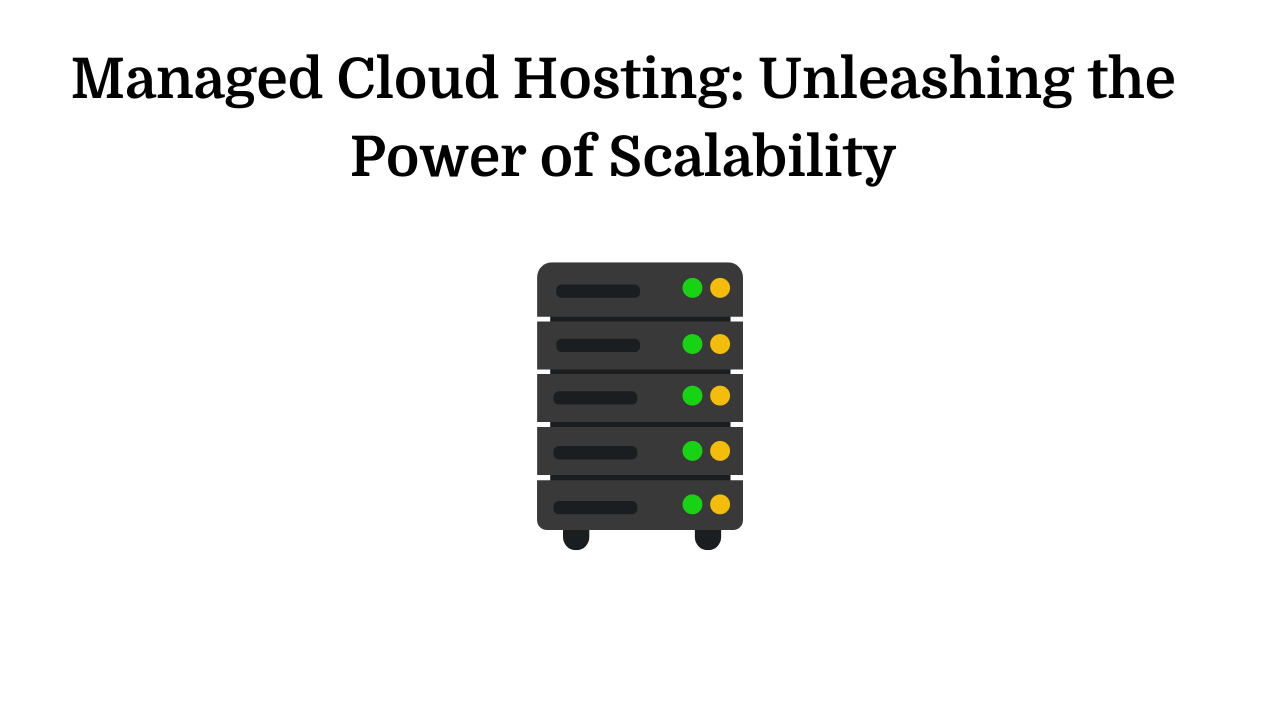In today’s fast-paced digital landscape, businesses need reliable and scalable hosting solutions to ensure smooth online operations. Managed cloud hosting has emerged as a game-changer, offering businesses the perfect blend of flexibility, security, and scalability. This comprehensive guide dives deep into the world of managed cloud hosting, shedding light on its features, benefits, and best practices, all while highlighting the power of seamless scalability.
Managed Cloud Hosting: What It Means for Your Business
Managed cloud hosting, often referred to as managed cloud services, is a specialized type of hosting that combines the advantages of cloud computing with professional management. This service allows businesses to harness the power of cloud infrastructure while outsourcing the complex management tasks to experts. By doing so, businesses can focus on their core operations while leaving the technical intricacies to seasoned professionals.
The Key Advantages of Managed Cloud Hosting
Managed cloud hosting comes packed with a plethora of benefits that can significantly impact your business’s performance. Here are some compelling reasons why managed cloud hosting should be on your radar:
1. Enhanced Scalability and Flexibility
Managed cloud hosting offers unparalleled scalability, allowing your business to effortlessly adjust its resources based on fluctuating demands. Whether you experience sudden spikes in website traffic or anticipate growth, managed cloud hosting ensures your infrastructure can seamlessly scale up or down.
2. Robust Security Measures
Security is a top priority for any online business. Managed cloud hosting provides advanced security protocols and regular updates, safeguarding your data from potential threats. With dedicated security professionals at the helm, you can rest easy knowing your digital assets are in capable hands.
3. 24/7 Technical Support
Unlike traditional hosting, managed cloud hosting comes with round-the-clock technical support. Whether it’s a minor glitch or a major concern, expert support is just a call away, ensuring minimal downtime and uninterrupted operations.
4. Optimal Performance and Speed
Managed cloud hosting optimizes your website’s performance and speed through efficient resource allocation and load balancing. This translates to a seamless user experience and improved search engine rankings.
5. Cost Efficiency
While managed cloud hosting involves a subscription fee, it eliminates the need for in-house IT management and hardware investments. This cost-effective approach allows businesses to allocate resources more strategically.
How Managed Cloud Hosting Works
Managed cloud hosting operates on a foundation of virtualization, where multiple virtual servers coexist on a single physical server. These virtual servers are interconnected and draw resources from a pool of physical servers, ensuring redundancy and high availability.
Here’s a simplified breakdown of how managed cloud hosting works:
- Virtualization: The physical server is divided into multiple virtual machines, each operating independently with its own resources and operating system.
- Resource Pooling: The virtual machines draw resources (such as CPU, RAM, and storage) from a centralized pool of physical servers.
- Load Balancing: Incoming requests are distributed across the virtual machines to prevent any single server from becoming overloaded, ensuring optimal performance.
- Professional Management: Seasoned IT professionals manage and monitor the infrastructure, ensuring security, updates, and overall smooth operations.
Best Practices for Harnessing the Power of Managed Cloud Hosting
Making the most of managed cloud hosting requires a strategic approach. Here are some best practices to keep in mind:
1. Assess Your Needs: Before migrating to managed cloud hosting, assess your business’s specific requirements to determine the optimal resource allocation.
2. Choose the Right Provider: Research and select a managed cloud hosting provider that aligns with your business goals and offers the necessary features and support.
3. Regular Monitoring: While professionals manage the infrastructure, it’s important to regularly monitor your website’s performance and security to catch any potential issues early.
4. Scale Wisely: Leverage the scalability of managed cloud hosting to accommodate growth efficiently. However, avoid over-provisioning, which can lead to unnecessary expenses.
5. Backup and Recovery: Implement robust data backup and recovery strategies to ensure your data is protected and can be restored in case of any unforeseen events.
6. Stay Updated: Keep track of industry trends and technological advancements to ensure your managed cloud hosting setup remains current and optimized.
FAQs about Managed Cloud Hosting
Q: How does managed cloud hosting differ from traditional hosting?
A: Managed cloud hosting combines the benefits of cloud infrastructure with expert management, offering scalability, security, and round-the-clock support that traditional hosting may lack.
Q: Can I migrate my existing website to managed cloud hosting?
A: Absolutely. Managed cloud hosting providers often offer migration services to seamlessly transition your website while minimizing downtime.
Q: Is managed cloud hosting suitable for small businesses?
A: Managed cloud hosting is versatile and can be tailored to suit businesses of all sizes. Small businesses can benefit from its scalability, security, and cost-efficiency.
Q: What happens if I experience a sudden surge in website traffic?
A: Managed cloud hosting’s scalability ensures that your website can handle sudden spikes in traffic without compromising performance.
Q: Are there any security risks associated with managed cloud hosting?
A: Managed cloud hosting providers prioritize security, but it’s important to implement additional security measures and regularly update your applications to mitigate potential risks.
Q: Can I upgrade or downgrade my resources as needed?
A: Yes, managed cloud hosting allows you to easily adjust your resources based on your business’s evolving needs.
Conclusion: Embrace Seamless Scalability with Managed Cloud Hosting
In the dynamic digital landscape, businesses must stay agile and responsive to changing demands. Managed cloud hosting emerges as a beacon of reliability, offering unmatched scalability, robust security, and expert management. By harnessing the power of managed cloud hosting, businesses can ensure optimal performance, seamless user experiences, and the flexibility to adapt to whatever the future holds.
Don’t miss out on the countless benefits of managed cloud hosting—partner with a reputable provider today and empower your business for sustained success.
 vairalnews98.com Get Update News Fast
vairalnews98.com Get Update News Fast


